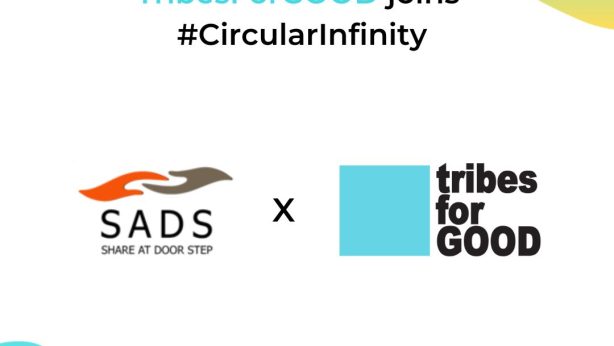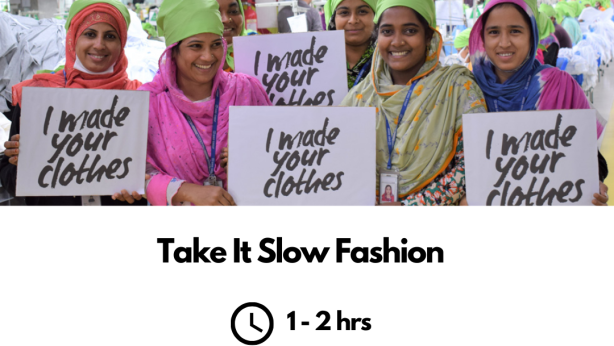One person won’t make a difference?
It’s no secret that the fashion industry is causing havoc on our planet. Fast fashion has captivated us through not only its grand stores on the high streets of the most glamorous cities across the world but around every corner of our local malls. Even though we know the sinister story behind our favourite fashion trends, we can’t help but look forward to being easily able to afford them.


People are aware of the child labour, sweat shops and terrible work conditions but that is just part of the story. From start to finish, fast fashion is wasting resources, filling our landfills, polluting our rivers and dehumanising people from low income communities.
According to Doodlage, by 2030, 500 billion items of clothing will be produced resulting in 310 billion meters squared of fabric that will be wasted. 73% of these items will end up in landfill sites due to our linear fashion system. Doodlage is tackling this issue by buying discarded fabric waste from factories and converting them into original and unique items of clothing. Furthermore, they convert their own fabric waste into accessories. What about the scraps you may ask? Fear not, these are used to make paper for their stationery range. All of these products are made by happy workers in an ethical manner.
We were lucky enough to interview one of the founders of Doodlage, Kriti Tula who has given an even further insight into what they do and why!
Question: What is the scope for slow fashion to reduce the production of high resource consuming cotton?
Answer: There are many alternative materials to replace high resource consuming cotton. Buying is our superpower and each one of us needs to invest it more carefully. A lot of slow fashion brands are working with alternative materials. Some alternatives are regenerated or recycled yarns or less resource intensive natural fabrics like hemp, banana and bamboo to name a few. Otherwise, people need to make the effort to upcycle more clothes, consume less, swap more and buy preloved clothing.
Question: What is the Unique Selling Point of Doodlage versus other fashion brands?
Answer: Doodlage has a number of unique selling points in comparison to other fashion brands. Firstly, we are a sustainable fashion brand. Doodlage started with an idea of making sustainable fashion accessible to the mass millennial consumer market in India. We have worked for the last four years to understand the post consumer and post production garment/fabric waste in India to find effective and desirable solutions. Secondly, instead of sourcing ethically made fabrics as many other ethical fashion brands do, we source our fabrics from large-scale production units in India in the form of defective fabrics, off cuts and end of the line fabrics along-with rejected garments. These fabrics/garments are patched and embroidered before getting converted into limited edition collections. Thirdly, our own waste is shredded to make textures for our bags and home collections. Cotton scraps that are left behind are decomposed to make paper for our stationery collection pushing for zero waste. Fourth, we are now taking steps to collect garments at the end of its life and upcycle, recycle or resell them!
Question: What makes Doodlages a sustainable brand?
Answer: Doodlage aims to address sustainable fashion in a more holistic manner. From managing our own and other factories post production waste to finding desirable solutions for post consumer waste in India through upcycling and recycling their clothing and fabrics.
Question: What is one of your favourite pieces of clothing from Doodlage? Why?
Answer: I mostly get to keep only Doodlage test fits. I enjoy how imperfect and unique they are. We work with such short lived and limited collections that it’s hard to find one perfect piece but I love the paper we make out of fabric waste which makes our kick ass notebooks.


Question: Do you measure the impact of your brand? Can you give us an example for our readers on how it is measured?
Answer: In 2030, an estimated 500 billion garments will be produced and 310 billion meters squared of fabric will be wasted, which will fill up our landfills. 73% of these produced garments will further fill up our landfills, which are already overflowing. In one year, we saved 15 000 meters of fabric and aim to save 96 330 meters in 2021. Fortunately, out of 440 million millennials in India, 198 million consider sustainable choices. We hope this will continue to rise.
Question:Do you think showbiz events like Met Gala or even Cannes could be an ideal opportunity to spread awareness and promote eco-clothing?
Answer: Yes, celebrities and large scale events allow getting the right eyeballs on eco clothing and start global conversations. Additionally, prominent designers also have a major role to play in spreading awareness such as Stella Mccartney who was one of the first designers to incorporate an ethical attitude within her business model.
Question: What advice would you give to a smart, driven college student about to enter the “Sustainable Fashion” industry? What advice should they ignore?
Answer: It’s important to scale and make eco lifestyle choices a little more affordable and accessible to large scale audience. We don’t need a few brands and people doing eco lifestyle perfectly, we need billions of them doing it imperfectly. As a collective we need to do more than social media activism. We need people to actually get out there and do it.
Question: Can you give One piece of advice for someone who is on a journey towards sustainability and giving back?
Answer: Take smaller steps and make little changes. There is so much to do, that you can pick up anything that you care about and start there. It could be about buying less, fixing more garments, finding more sustainable alternatives, buying preloved/second-hand clothing or doing more swapping parties. Do whatever it takes to make eco cool. Be proud of giving a damn.
People are often quick to say “one person won’t make a difference”. Yet, if each and every one of us made the little changes Kriti has shared with us, we would have a much healthier and happier planet. Doodlage is not only creating sustainable clothing and dialogue about the fast fashion industry, they are also making fashionable clothing that keeps up with the fashion trends around the world.
Image source: Doodlage


